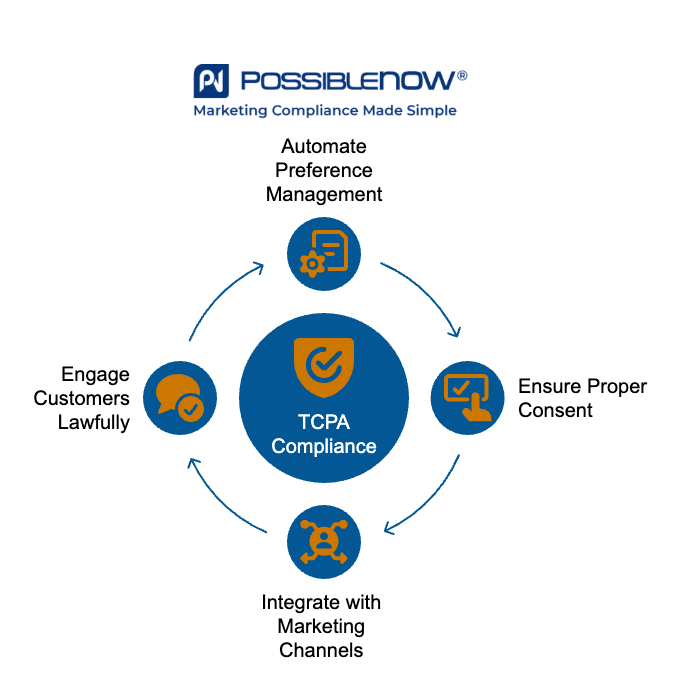Resource Center
What Is the Penalty for Violating the TCPA?
Type: Blog
Topic: Do Not Call Solution

The penalties for violating the Telephone Consumer Protection Act (TCPA) can be severe, ranging from substantial fines to long-term reputational damage. TCPA violations occur when companies send unsolicited communications, such as calls or texts, to consumers without obtaining proper consent. Each violation can result in fines ranging from $500 to $1,500 per call or message, depending on whether the violation is found to be willful or negligent.
Given the scale of many marketing campaigns, the costs can quickly escalate into millions of dollars, making TCPA compliance critical for businesses of all sizes. But the financial burden isn’t the only concern—TCPA violations can lead to class-action lawsuits and significantly damage a company’s reputation.
To help companies navigate these complex regulations, PossibleNOW’s DNCSolution provides comprehensive compliance tools. DNCSolution allows businesses to manage customer preferences and maintain proper consent records, reducing the risk of TCPA violations across all communication channels.
By integrating compliance into your marketing strategy, PossibleNOW helps businesses avoid penalties while fostering trust with customers.
In the following sections, you’ll find information on:
Speak With an Expert Today
How Class-Action Lawsuits Can Multiply TCPA Penalties
TCPA violations don’t just result in fines. When multiple consumers are affected, companies can face class-action lawsuits that multiply the financial impact. In a class-action lawsuit, all individuals affected by the same TCPA violation can file a collective claim, increasing the number of violations and potential payouts.
For example, in 2013, Papa John’s was involved in a TCPA class-action lawsuit for sending millions of unsolicited text messages to customers. The case settled for $16.5 million, but the reputational damage was just as significant, as the lawsuit highlighted the company’s disregard for customer privacy.
Even more recently, ViSalus, a marketing company, was hit with a $925 million TCPA verdict after sending nearly two million robocalls without proper consent. This judgment shows how severe the consequences can be when TCPA violations are allowed to multiply unchecked.
These lawsuits demonstrate that failing to properly manage communication preferences can expose your business to substantial legal and financial risks.
Reputational Damage: The Hidden Cost of TCPA Violations
While the financial penalties for violating the TCPA can be massive, the damage to a company’s reputation can be even more costly in the long run. When businesses fail to respect customer preferences, they erode trust, which can lead to customer attrition, negative media coverage, and long-term harm to the brand.
In the case of Papa John’s, the settlement itself was costly, but the public perception of the company suffered greatly as a result of the lawsuit. Customers were frustrated by the unsolicited messages, and the media coverage portrayed the company as invasive, diminishing customer loyalty.
Rebuilding consumer trust after such violations is an uphill battle, one that many companies struggle to overcome.
To avoid these risks, companies need to prioritize compliance as part of their overall marketing strategy.
Protecting Your Business with TCPA Compliance Solutions

PossibleNOW’s Do Not Call platform is designed to help businesses stay compliant by automating the management of customer preferences and opt-out records. By leveraging TCPA tools, businesses can take proactive steps to ensure they have proper consent before sending communications, mitigating the risk of costly penalties.
Don’t let TCPA violations jeopardize your business. PossibleNOW’s DNCSolution integrates seamlessly with your existing marketing channels, allowing you to manage consent across email, SMS, phone calls, and more. This holistic approach reduces the complexity of compliance while giving businesses the tools they need to engage customers lawfully. Contact us today for a consultation.
Request a Demo Today
About PossibleNOW
PossibleNOW is the pioneer and leader in customer consent, preference, and regulatory compliance solutions. We leverage our MyPreferences technology, processes, and services to enable relevant, trusted, and compliant customer interactions. Our platform empowers the collection, centralization, and distribution of customer communication consent and preferences across the
enterprise. DNCSolution addresses Do Not Contact regulations such as TCPA, CAN-SPAM and CASL, allowing companies to adhere to DNC requirements, backed by our 100% compliance guarantee.
PossibleNOW’s strategic consultants take a holistic approach, leveraging years of experience when creating strategic roadmaps, planning technology deployments, and designing customer interfaces. PossibleNOW is purpose-built to help large, complex organizations improve customer experiences and loyalty while mitigating compliance risk.
-
TCPA Regulations and Compliance: Complete Guide
Type: Blog
Topic: Do Not Call Solution
-
Defining Meaningful Metrics: 6 Soft KPIs to Measure Customer Preference Collection
Type: Blog
Topic: Preference Mgmt
-
Email Preference Center Best Practices
Type: Blog
Topic: Preference Mgmt
-
The Basics of DNC Scrubbing: What Is a Do Not Call (DNC) Scrubber and Why Do You Need It?
Type: Blog
Topic: Do Not Call Solution
-
What is Consent Management, How it Works, & Why it’s Important for Data Compliance
Type: Blog
Topic: Consent Mgmt
-
Do Insurance Companies Cover TCPA Damages?
Type: Blog
Topic: Do Not Call Solution
-
8 Best Practices for Capturing GDPR Consent
Type: Webinars
-
Data Silos Cause Communication Gaps
Type: Videos
Topic: Preference Mgmt
-
Difference Between Preferences & Consent
Type: Videos
Topic: Preference Mgmt
-
Integrate Do Not Call Compliance with Preferences
Type: Videos
Topic: Preference Mgmt
-
Customer Preferences Require More Than One Flavor
Type: Videos
Topic: Preference Mgmt
-
Give Customers Opt-Down Options
Type: Videos
Topic: Preference Mgmt
-
Preference Center Organization
Type: Videos
Topic: Preference Mgmt
-
Strategic Consultants Benefited Scotiabank
Type: Videos
Topic: Industry Testimonials
-
Best Practices for Managing Do Not Email Lists
Type: Blog
Topic: Do Not Call Solution
-
How Do Not Call Rules Apply to Nonprofit Organizations
Type: Blog
Topic: Do Not Call Solution
-
How to Train Your Call Center on DNC Rules
Type: Blog
Topic: Do Not Call Solution
